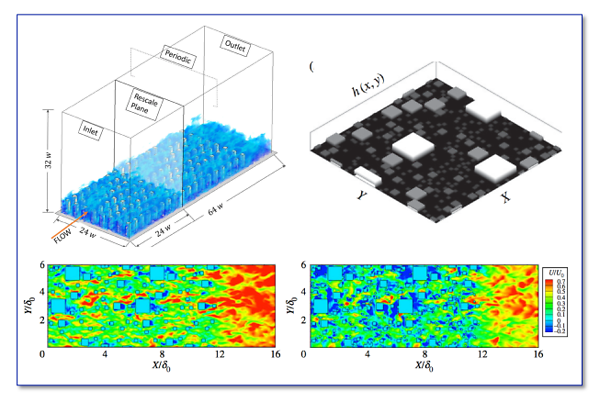"Integral wall-model for Large Eddy Simulations and analytical roughness models for turbulent flows over rough surfaces at high Reynolds numbers" by Prof. Meneveau

Date
Location
Description
Date : March 21st (Tue), 2017
Time: 11:00am – 12:00pm
Venue: C210 seminar room
Speaker: Professor Charles Meneveau (Johns Hopkins University)
Title of his first seminar:
Integral wall-model for Large Eddy Simulations and analytical roughness models for turbulent flows over rough surfaces at high Reynolds numbers
Abstract:
We summarize a new wall model for LES, the integral wall model (iWMLES) and apply it to simulations of flow behavior within the roughness layer of turbulent boundary layer flow over rough surfaces. We consider several configurations consisting of arrays of rectangular-prism roughness elements with various spacings, aspect ratios and height distributions. The results provide clear evidence for exponential behavior of the mean flow with respect to the wall normal distance. Once established, the generic velocity profile shape is used to formulate a fully analytical model for the effective drag exerted by turbulent flow on a surface covered with arrays of rectangular-prism roughness elements. The approach is based on the integral method by von-Karman Pohlhausen in which a shape function is assumed for the mean velocity profile and its parameters are determined based on momentum conservation and fundamental constraints. Comparisons between model predictions and experimental/numerical data from the existing literature as well as LES data from this study are presented. Applications to flow over multiscale roughness elements are discussed. Work done in collaboration with Xiang Yang, Jasim Sadique and Rajat Mittal
BIO-SKETCH:
Charles Meneveau is the Louis M. Sardella Professor in the Department of Mechanical Engineering at Johns Hopkins University. He also has a joint appointment in the Department of Environmental Health and Engineering, and is Associate Director of the Institute for Data Intensive Engineering and Science (IDIES) at Johns Hopkins. He received his B.S. degree in Mechanical Engineering from the Universidad Técnica Federico Santa María in Valparaíso, Chile, in 1985 and M.S, M.Phil. and Ph.D. degrees from Yale University in 1987, 1988 and 1989, respectively. During 1989/90 he was a postdoctoral fellow at the Stanford University/NASA Ames' Center for Turbulence Research.
Professor Meneveau has been on the Johns Hopkins faculty since 1990. His area of research is focused on understanding and modeling hydrodynamic turbulence, and complexity in fluid mechanics in general. He combines computational, theoretical and experimental tools for his research. Special emphasis is placed on the multiscale aspects of turbulence. Currently he is focused on applications of LES to wind energy and on methods to share the very large data sets that arise in computational fluid dynamics.
Professor Meneveau is a foreign corresponding member of the Chilean Academy of Sciences, and a Fellow of the American Academy of Mechanics, the U.S. American Physical Society and the American Society of Mechanical Engineers. He received an honorary doctorate from the Danish Technical University (in 2016), the inaugural Stanley Corrsin Award from the American Physical Society (2011), the 2004 UCAR Outstanding Publication award (with students and other colleagues at JHU and NCAR), the Johns Hopkins University Alumni Association's Excellence in Teaching Award (2003), and the APS' François N. Frenkiel Award for Fluid Mechanics (2001).
He is Deputy Editor of the Journal of Fluid Mechanics and served for 13 years as the Editor-in-Chief of the Journal of Turbulence (until 2015). In the past, he has served as Associate Editor for the Journal of Fluid Mechanics, as member of the Editorial Committee of the Annual Reviews of Fluid Mechanics and as an Associate Editor for Physics of Fluids.
We look forward to seeing many of you at the seminar.
Attachments
Subscribe to the OIST Calendar: Right-click to download, then open in your calendar application.



